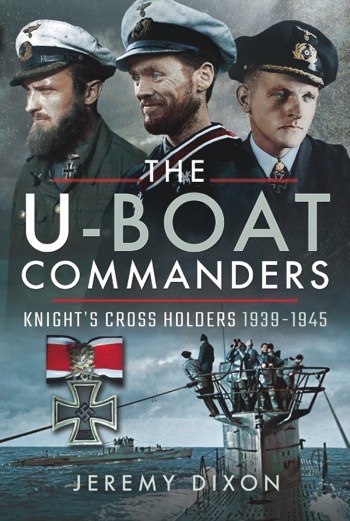
The U-Boat Commanders: Knight’s Cross Holders 1934-1945. By Jeremy Dixon. Pen and Sword Books, Barnsley, 2019
Reviewed by Darren Puttock
Of all the aspects of the German war machine, in his WWII memoirs Winston Churchill admitted “the only thing that ever really frightened me during the war was the U-boat peril.” The Battle of the Atlantic was the only active theatre that lasted the entirety of the war, and the German Unterseebootwaffe scored incredible victories over Allied shipping.
During periods of “Happy Times”, German U-Boat commanders amassed huge numbers during patrols in the mid-Atlantic and off the eastern United States. U-Boats pounded on shipping near the United Kingdom, prowled up the St Lawrence river, sunk ships in view of tourists on American beaches, and decimated convoys by coordinating attacks with large groups of U-Boats called Rudeltaktik – the wolfpack.
As U-Boats scored victories, successful commanders became national heroes. Names like Günther Prien, Otto Kretschmer, Reinhard Hardegen, and Erich Topp became household names as the German press boasted of their exploits to the public. As more and more Allied ships sank to the bottom of the ocean, U-Boat commanders were awarded Germany’s highest honours for bravery, leadership, and success. One of the highest amongst these awards was the Knight’s Cross, which was worn around the neck with a red, white, and black ribbon. U-Boat Commanders, who were highly competitive, often joked of having an “itchy neck” as they prowled the shipping lanes and pressed home the attack in search of the vaunted decoration.
This book represents an authoritative reference guide of the German U-Boat Commanders who were awarded the Knight’s Cross to cure their “itchy neck”. Organised into sections by grade of the Knight’s Cross (up to Knight’s Cross with Oakleaves, Swords and Diamonds) and then alphabetically by name, the study details the U-Boat patrol record of each Commander in a narrative style. In addition to a detailed description of their U-Boat career, the text includes pre-war and post-war records of each Commander.
Of course, post-war details are not available in the book for many Commanders due to the horrific losses suffered by U-Boats during the war. After May 1943, known as “Black May”, U-Boat losses were so acute the Befehlshaber der Unterseeboote (BdU, Command HQ of the U-Boats) pulled them out of the mid-Atlantic. The Allied technological and military power advantages were so great 75% of U-Boat crews failed to return from patrol. Reading through the book gives a sense for just how many Commanders and their crews were killed in action.
Despite U-Boat losses being the highest of any service, the bravery of the Commanders and crews are readily apparent in the text. Though the most famous and highest scoring Commanders achieved their successes early in the war when the odds were in the U-Boat’s favour, U-Boats did continue to achieve some modest success late in the war. Commanders such as Siegfried Lüdden and Alfred Eick were awarded the Knight’s Cross for leadership and success after May 1943; however, reading through the book one can see the levels of early successes were simply not repeated. The likes of Otto Kretschmer (47 ships sunk, 274,418 tons) and Reinhard Hardegen (22 ships sunk, 115,656 tons) were not matched by Lüdden (9 ships sunk, 50,915 tons) or Eick (10 ships sunk, 67, 191 tons). Indeed, it seems by the end of the war some Commanders were awarded the Knight’s Cross simply for surviving a patrol and achieving any success at all.
The detail of research that must have accompanied this book can’t be adequately described in this brief summary and review. Though the broad history of the Battle of the Atlantic against the U-Boats has been widely covered in books and film, this niche study collates and presents information on Commanders that is truly unique. Of interest is the inclusion of Admiral Karl Dönitz, who was awarded the Knight’s Cross with Oakleaves for his leadership of the German U-Boat force. Dönitz, who Hitler appointed as his successor, later served ten years in prison for his role in the war. He remained unrepentant for his wartime record as he believed he always acted correctly and in the best interests of his country.
This book contains graphic text and photographs—many from the author’s personal collection—that will appeal to those undertaking research, U-Boat enthusiasts, or indeed anyone interested in reading about the bravery of men facing overwhelming odds. This well-researched and well-presented book is very deserving of your consideration as the authoritative reference for the achievements of U-Boat Commanders who were awarded the Knight’s Cross.



